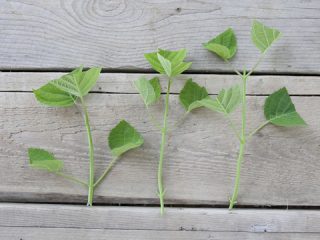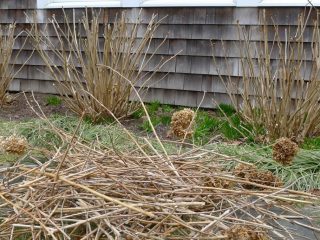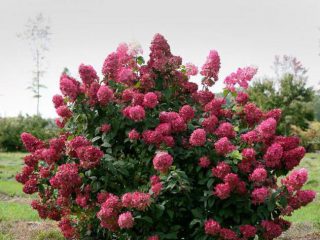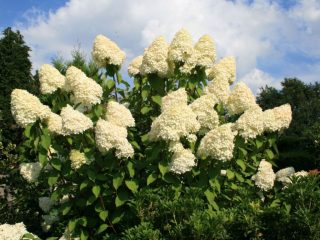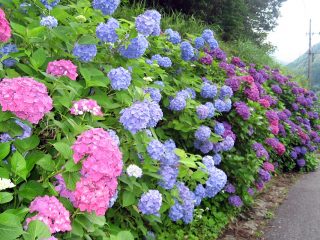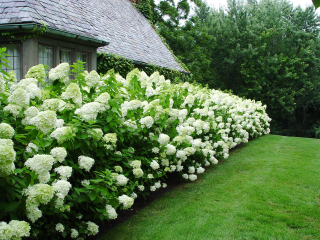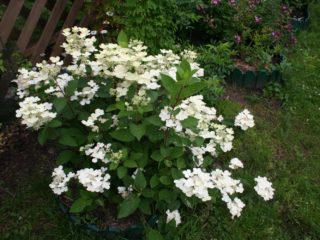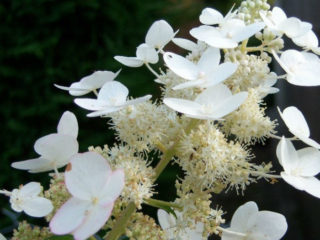Content
- 1 What varieties of paniculate hydrangea are there?
- 2 Winter-hardy varieties of paniculata hydrangea
- 3 The most beautiful and unpretentious varieties of paniculate hydrangea
- 4 Early flowering varieties of paniculata hydrangea
- 5 New varieties of paniculate hydrangea for 2021
- 6 High varieties of paniculata hydrangea
- 7 Dwarf varieties of hydrangea paniculata
- 8 Hydrangea paniculata varieties for hedges
- 9 Rare varieties of paniculata hydrangea
- 10 Hydrangea paniculata varieties for shade
- 11 Conclusion
- 12 Reviews of paniculata hydrangea varieties
Hydrangea paniculata varieties with names give a good idea of the beauty and diversity of garden crops. Breeders offer species suitable for any conditions.
What varieties of paniculate hydrangea are there?
Hydrangea is a very popular plant in Russian summer cottages. And the paniculate variety is of particular interest; its inflorescences are lush, large, bright, and the species blooms throughout almost the entire summer.
Paniculate hydrangea comes in dozens of varieties.
Conventionally, they are divided according to the following criteria:
- height - there are tall and dwarf shrubs;
- the timing of the appearance of inflorescences, some varieties bloom in late spring, others only in mid-summer;
- requirements for cultivation - there are heat-loving and winter-hardy varieties, hydrangeas for sunny areas and for shade.
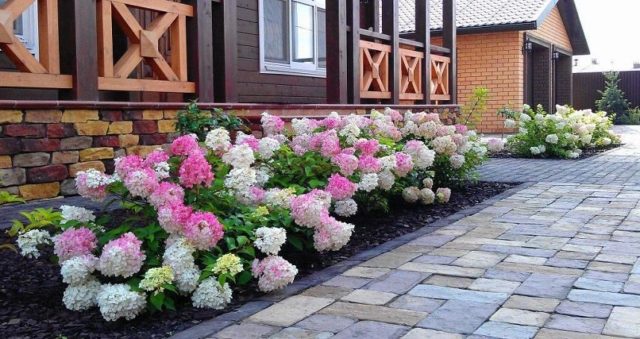
Paniculata hydrangea is used everywhere in landscape design.
To successfully select a plant, you need to study the main varieties of paniculate hydrangea with photos and settle on exactly the option that meets the growing conditions and the wishes of the gardener.
Winter-hardy varieties of paniculata hydrangea
The climate in most Russian regions is quite harsh, so species with increased resistance to cold are in demand. Even in frosty winters they do not suffer from low temperatures.
Candelight
A very beautiful variety of paniculate hydrangea, Candelight, grows up to only 1.5 m. It is distinguished by interesting flowering on young annual shoots. At the very beginning of the decorative period, in mid-summer, the plant produces white paniculate inflorescences, then they gradually acquire a creamy hue. As autumn approaches, Candelight flowers begin to turn pink until they are a uniform pink-red color.
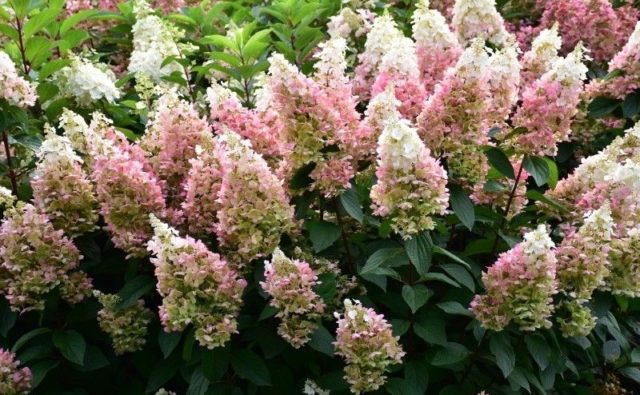
Candelight is a cold-resistant variety for all regions of Russia
Vanilla Fries
Another winter-hardy ornamental hydrangea is Vanilla Fries, recommended, among other things, for the Urals and Siberia. The height of the shrub rarely exceeds 1.5 m.
The cone-shaped inflorescences of the Vanilla Fries variety are very beautiful; initially their color is creamy white, but then turns pink.At the end of summer, the inflorescences become raspberry-pink in the main part, but retain their snow-white tops. The shrub blooms early, in June, and sometimes at the end of May.
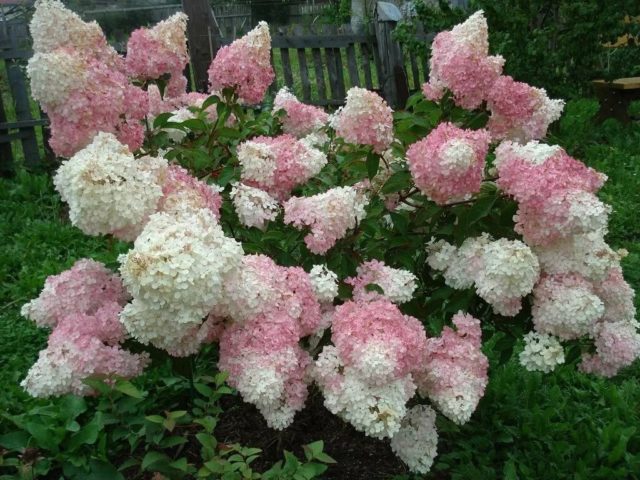
Vanilla Fries blooms have strawberry and creamy shades mixed in.
An adult shrub does not need to be covered for the winter in frosts down to -35 °C; it is enough to mulch the tree trunk circle.
Grandiflora
The famous Grandiflora variety is distinguished by its large size - the shrub rises 2.5 m above the ground surface and can grow to the same size in width.
The shrub blooms with large pyramid-shaped inflorescences. They are usually white-yellowish, but depending on conditions they can turn greenish or pink. The timing of flowering depends on the region - usually Grandiflora blooms at the very beginning of June, but it can bloom closer to mid-summer. Flowering panicles will remain until late autumn.
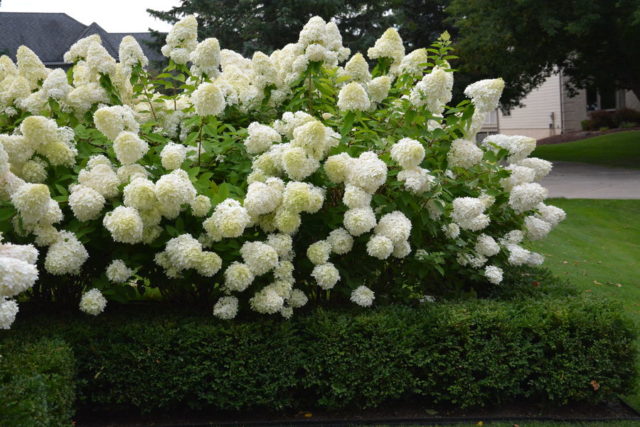
Grandiflora can grow in any area
The winter hardiness of the variety allows it to tolerate temperature drops down to -35 °C and more. In the Siberian regions and in the north-west, Grandiflora feels comfortable.
The most beautiful and unpretentious varieties of paniculate hydrangea
In search of beautiful hydrangeas for the garden, summer residents pay special attention to unpretentious varieties. It is easy to achieve lush flowering from such plants, since it depends little on the weather and soil quality.
Mega Pearl
Paniculata hydrangea Mega Pearl is a large shrub up to 2.5 m tall. Brings fragrant cone-shaped inflorescences, large and wide. At the beginning of flowering in July, hydrangea is greenish-white, then becomes creamy, and by autumn it acquires a pinkish-red hue and fades by October.
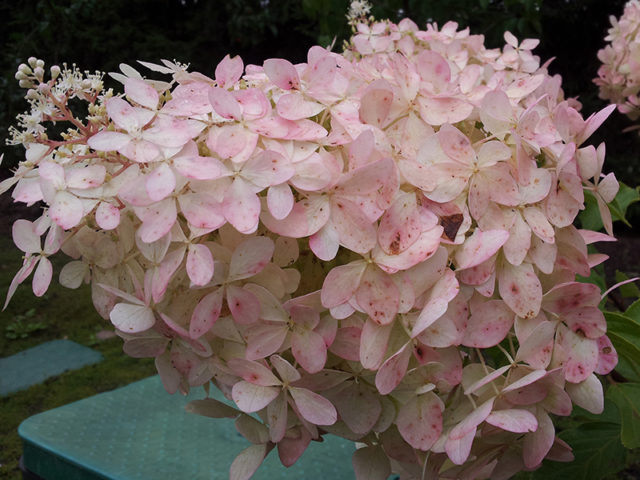
Mega Pearl has pink-red blooms
Prefers loose and moderately moist soils, but can bloom well in poor soil. Mega Pearl develops both in illuminated places and in slight shade, tolerates frosts below - 30 ° C and rarely suffers from diseases. The variety can be grown throughout Russia without much effort.
Goliath
Among the best varieties of paniculate hydrangea, Goliath can be noted. A powerful shrub stretches up to 3 m in height. Goliath's flowering begins at the end of July and lasts until the last days of September; the inflorescences look like narrow cones, white at the beginning of flowering and pale pink towards the end.
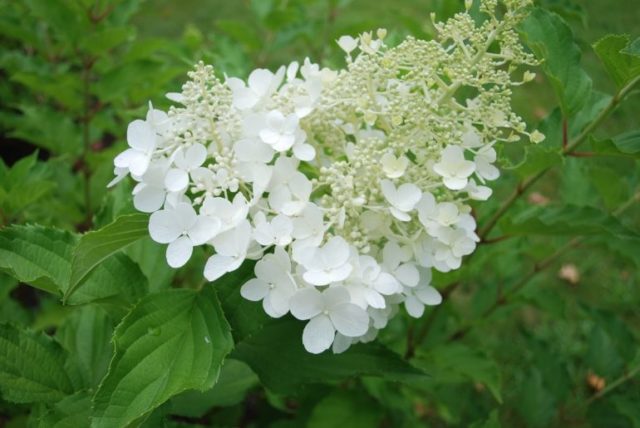
Goliath is a white variety that changes color to pink
The variety tolerates open sun and shade well and does not require winter shelter. It is best to plant Goliath in fertile, acidic soil, but any other soil is suitable.
Bombshell
Bombshell is a small shrub up to 80 cm tall and up to 1.5 m in diameter. The shape of the bush is round, densely leafy. It blooms from mid-June and remains decorative until frost, and the pyramidal inflorescences up to 16 cm in length have a cream or white-greenish color. In the last stages of flowering, hydrangea may turn pink.
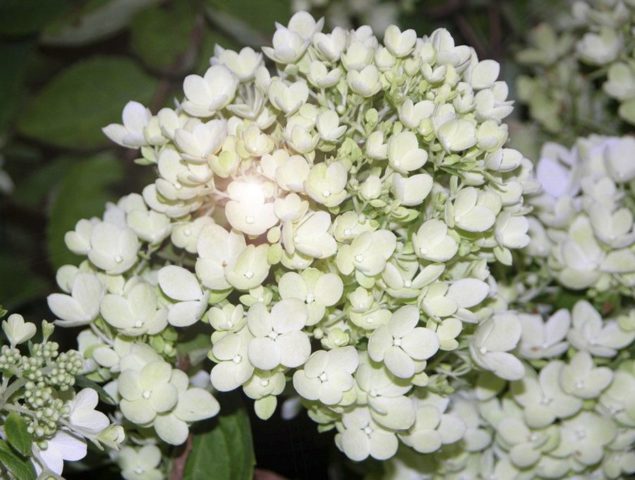
Bombshell is a low-growing, undemanding shrub.
Bombshell grows well in any type of soil and has increased frost resistance. The bush is rarely affected by pests and diseases, and hydrangea also holds its shape for a long time, so it rarely needs pruning.
Early flowering varieties of paniculata hydrangea
Early flowering varieties attract attention because they allow you to decorate the garden at the beginning of summer. Such hydrangeas are among the first to bloom in the garden and throughout the summer they delight the eye with bright panicles.
Airlie Sensation
A tall variety can rise 2 m above the soil level, the shoots of hydrangea are straight and elongated, the leaves are dark green, with standard jagged edges. Inflorescences bloom on fresh and last year's branches, the shape of the inflorescences is paniculate or spherical.
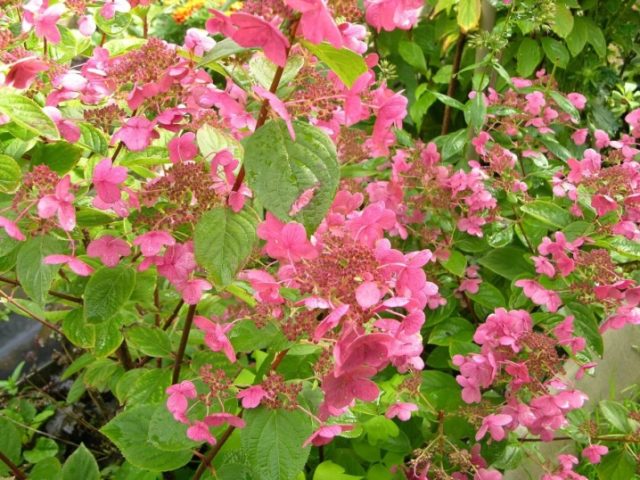
Airlie Sensation - early variety with purple-pink blooms
At the beginning of flowering, the plant usually produces cream flowers, but gradually they change shade to pink and purple. It blooms in early June and remains attractive until September.
Dentel de Gorron
The variety is distinguished by its tall growth up to 2.5 m and a rounded but compact crown. Flowering begins around June 15, hydrangea produces pyramidal panicles on long stalks. At first, the flowers of Dentel de Gorron are cream or slightly greenish, and then they become snow-white and remain that way until the end of the decorative period.
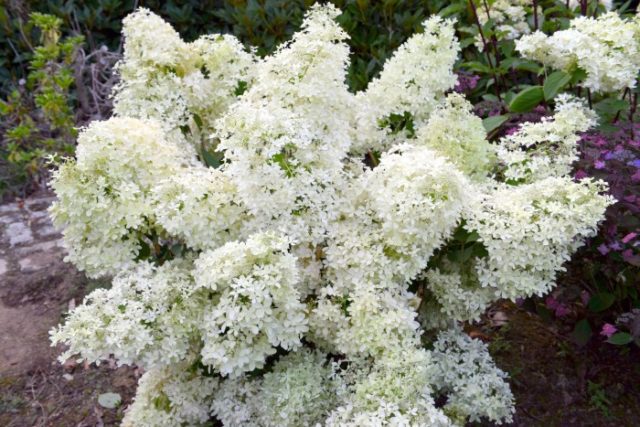
Dentel de Gorron blooms with abundant snow-white flowers
Prim White
Graceful hydrangea is distinguished by compact forms and grows to a maximum of 1.5 m. It blooms very early, until mid-July, producing large, 20 cm inflorescences, creamy white in early summer and pink closer to autumn.
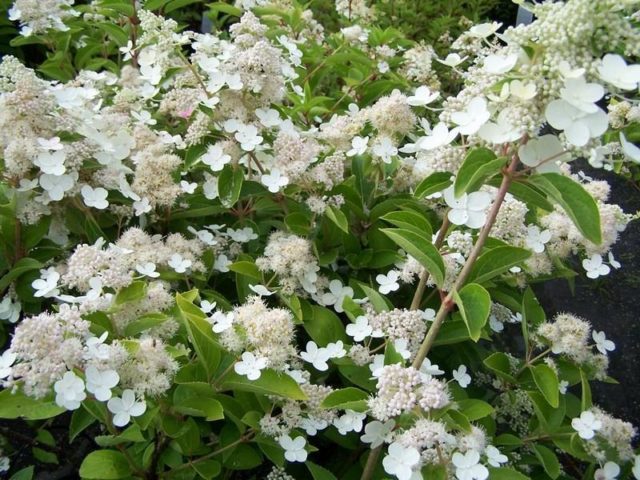
Prim White - a compact light-loving shrub
Prim White grows best in moist soils and lighted areas. It suffers little from winter frosts, since new shoots that have grown this spring are responsible for flowering.
New varieties of paniculate hydrangea for 2021
Fresh varieties of paniculate ornamental hydrangea appear annually. Breeders are continuously improving existing varieties and presenting plant lovers with even more colorful and easy-to-grow plants.
Samara Lydia
One of the new products, Samara Lydia.The variety of French selection is distinguished by its compact shape, slightly more than 1 m in diameter and height.
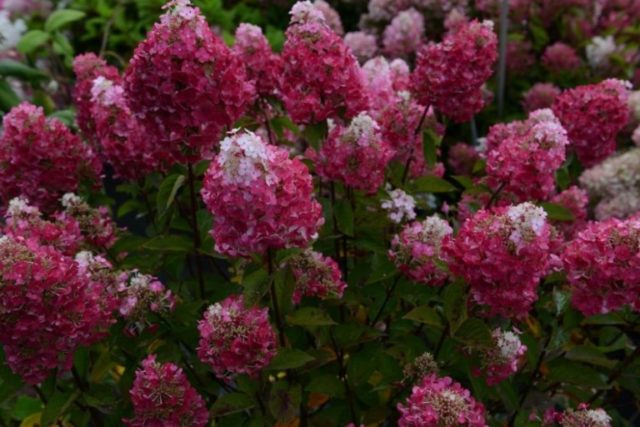
Samara Lydia - the latest new product with a whitish-purple color
Samara Lydia begins to bloom in July and remains beautiful until autumn. It bears cone-shaped apical inflorescences, the flowers are white at first, and later become pink and red.
Skyfall
New paniculate hydrangea is a low shrub up to 1.2 m tall. The bush grows up to 70 cm in width and bears very large inflorescences with unusual elongated petals of individual flowers.
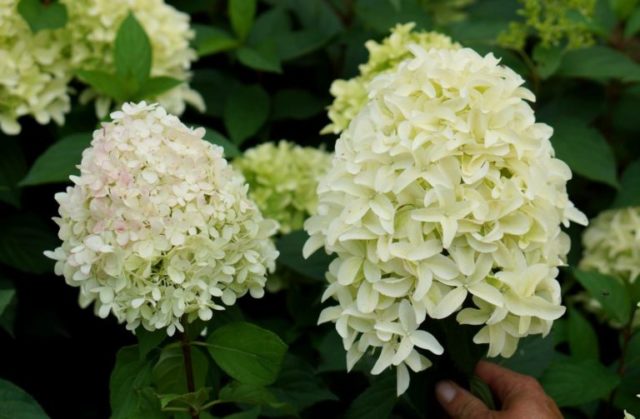
Skyfall - a variety with light flowers of unusual shape
The flowering of the variety begins in July and lasts until September; the color of the flowers is first greenish-white and then light pink. The variety is optimal for cultivation in the middle zone.
Magical Vesuvio
The new variety is Magical Vesuvio, with bush sizes up to 1.5 m in height and 1 m in diameter. The shrub bears tall and narrow pyramidal panicles of inflorescences; flowering is very dense and begins in July.

Magical Vesuvio changes color to crimson-red in the fall.
At first, the inflorescences of Magical Vesuvio are whitish in color, but very quickly turn pink, and by autumn they acquire a purplish-red color.
High varieties of paniculata hydrangea
Although caring for compact shrubs is in many ways easier, tall paniculate hydrangeas are no less in demand. They look especially impressive in garden design; it is impossible not to notice such a shrub.
Silver Dollar
The height of the bush can be more than 2.5 m, the shoots of the variety are straight and strong, not bending under the weight of the inflorescences.Silver Dollar blooms with snow-white panicles in mid-July, then turns pink closer to autumn, and by the onset of October frosts it acquires a brown color. In the garden, the variety looks very advantageous and attracts attention anywhere in the area.
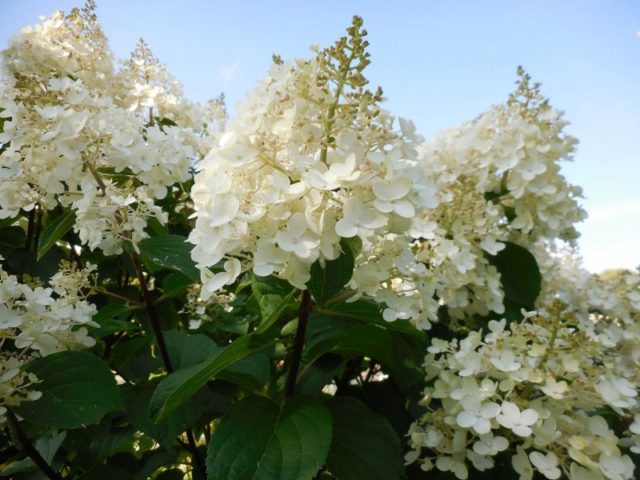
Silver Dollar - a snow-white shrub that darkens in autumn
White Lady
Compact hydrangea with a round shape rises up to 3 m in height. White Lady begins to bloom in early June and remains beautiful until late autumn. The inflorescences of decorative paniculate hydrangea are cone-shaped, long, up to 30 cm. Initially, the flowers have a creamy tint, but then begin to turn pink until they become bright pink in the fall. Hydrangea emits a pleasant aroma.
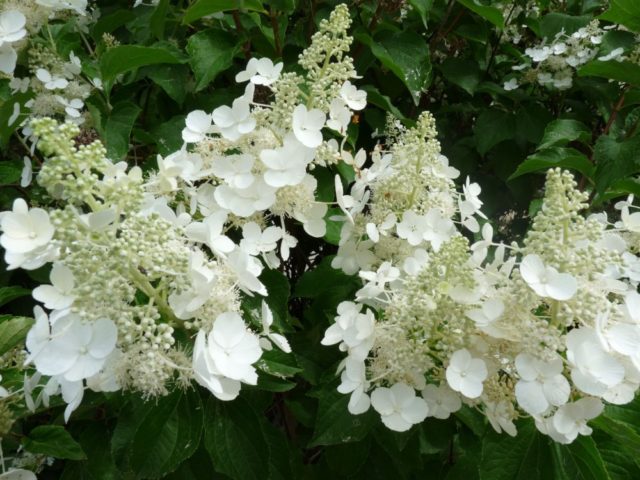
White Lady - a beautiful paniculate hydrangea with a pleasant aroma
Pinky Winky
Pinky Winky is a tall shrub up to 3 m tall, which adds 25-35 cm annually. The crown of the bush is spreading, without a specific shape, so paniculate hydrangea requires regular pruning.
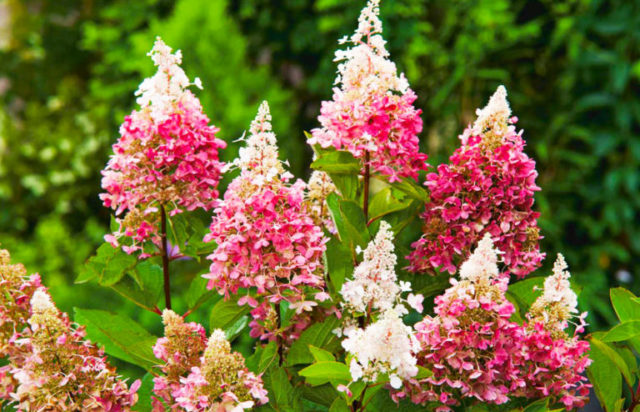
Pinky Winky has inflorescences in the form of bright two-color pyramids
Pinky Winky blooms from June until the onset of autumn cold weather; the inflorescences are pyramidal, pointed, first white, and then pinkish and deep pink.
Dwarf varieties of hydrangea paniculata
Miniature hydrangeas are no less in demand. They are most often used to form hedges, compact landscape groups and flower beds.
Bobo
The height of the Bobo variety is only about 60 cm, and during the season the shrub adds 10 cm in height. Adult paniculate hydrangea is spherical, compact, with pyramidal inflorescences 15 cm in length.
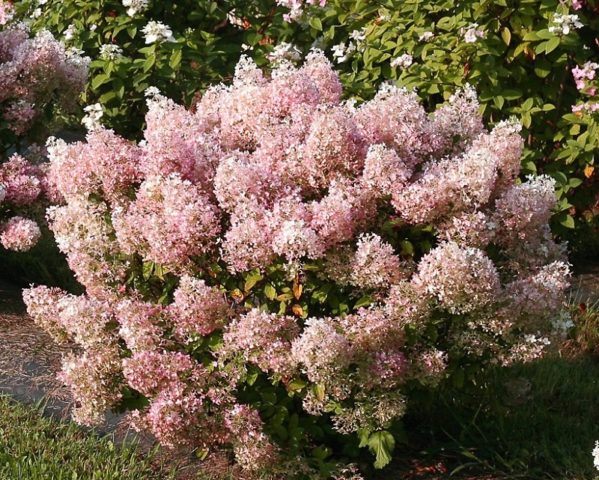
The Bobo variety rarely exceeds 60 cm
The shrub blooms early, as early as June, and its decorative effect lasts until September. At first, the blossoming flowers of the Bobo variety are white with a pistachio tint, then they acquire light pinkish and creamy shades.
Sunday Frize
The Sunday Fries variety is another low variety with a spherical bush, rising no higher than 1 m. The shrub blooms in June, and the decorative period continues until October. Sunday Fries brings lush panicles - first white, then pale pink or lilac. The advantage of this variety is that it does not require frequent pruning and retains its shape well.
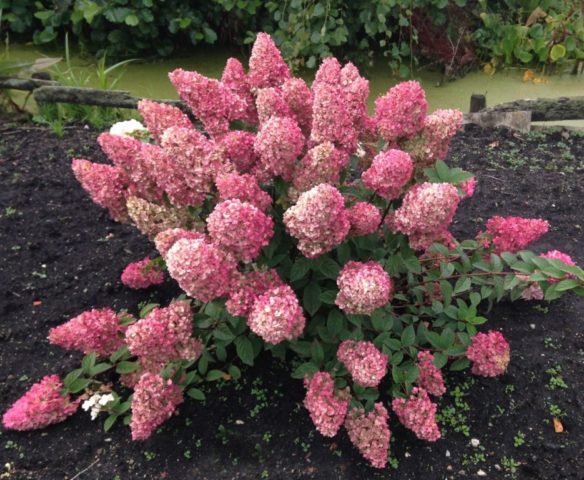
Sunday Frize rises 1 m above the ground
Daruma
Daruma is a low-growing variety of paniculate hydrangea, usually not exceeding 1.5 m, with straight shoots of a reddish color. The variety begins to bloom in June and lasts until frost.
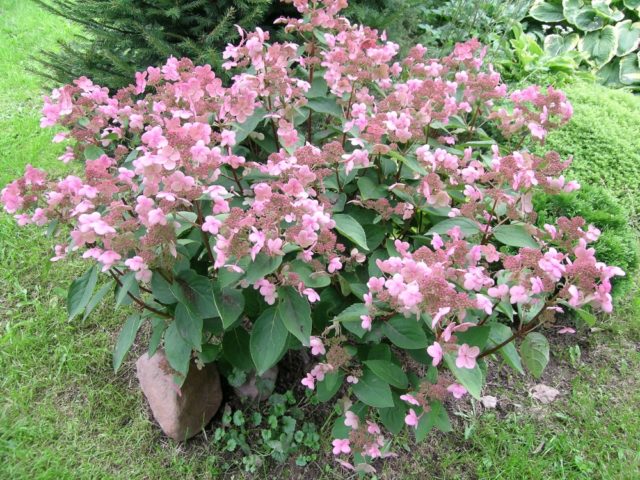
Daruma - a pink variety of short growth
Dwarf Daruma bears paniculate inflorescences that change color throughout the summer from cream to dark pink. At the end of the season, the flowers take on a dark wine hue.
Hydrangea paniculata varieties for hedges
Hydrangea is the most popular option for forming a dense hedge on an area. To create a beautiful hedge, you need to choose medium-sized varieties with good foliage that tolerate bright sunlight well.
Pink Diamond
The Pink Diamond variety rises up to 2 m in height and can reliably close the area from prying eyes. In width, paniculate hydrangea can grow up to 3 m. The shoots of hydrangea are rigid, vertical, and grow quite quickly - 30 cm per year.
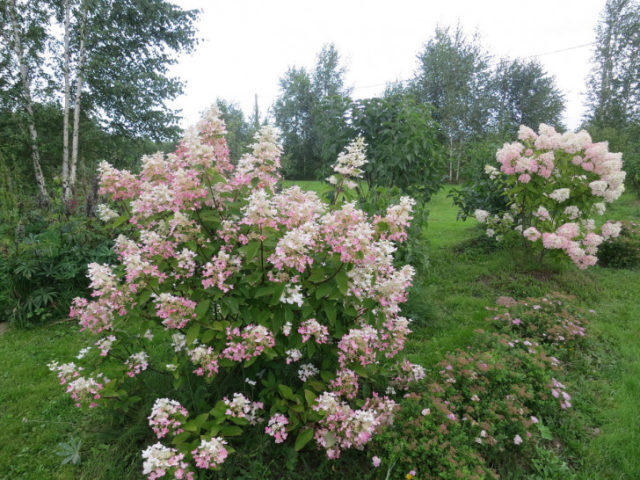
Pink Diamond is often used to create hedges
Pink Diamond produces creamy white cone-shaped blooms in midsummer, but over time the flowers turn pink and reddish in color, remaining that way until September. The shrub is good because it rarely breaks from the wind and, moreover, grows well even near roads, in unfavorable environmental conditions.
Lime Light
In the rating of panicle hydrangea varieties, Lime Light must be mentioned. The variety is quite tall, up to 3 m, suitable for those who want to create a truly reliable hedge. It spreads up to 1.8 m in diameter and blooms from July to October. The unusual shade of the pyramidal inflorescences is noteworthy. Initially they are soft green, in the shade they can retain this color until autumn, and in the sun they become white and pinkish.
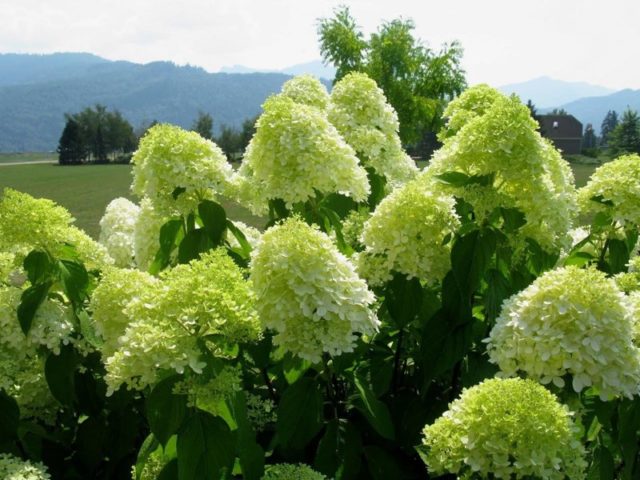
Using Lime Light you can organize a high hedge
Diamond Rouge
The Diamond Rouge variety allows you to create a low but very impressive hedge. The shrub rises only 1 m above the ground, but it is valued mainly for the beauty of its flowering. In early June, the variety produces snow-white flowers, but after a couple of weeks they begin to turn pink and by the end of summer they become raspberry-burgundy.
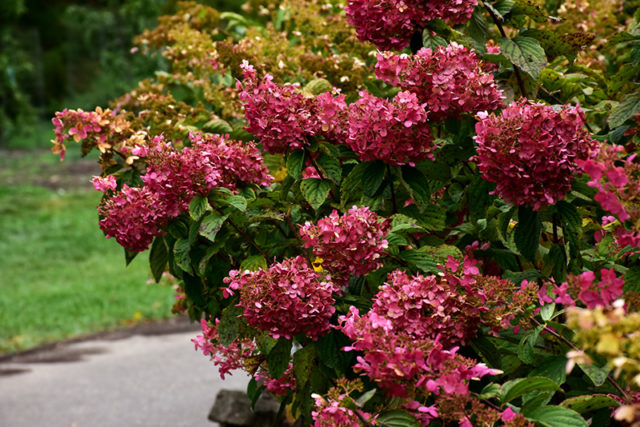
Diamond Rouge has spectacular fall color
In autumn, hydrangea leaves also acquire a decorative color; they turn orange-purple. Paniculata hydrangea grows quite slowly, but it does not have to be formed often.
Rare varieties of paniculata hydrangea
In the descriptions and videos of panicle hydrangea varieties, there are plants with unusual colors or flower shapes. They can rarely be found in summer cottages.
Pastel Green
One of the most unusual paniculate hydrangeas is the low, up to 1.5 m, Pastel Green, which changes the color of its inflorescences up to 7 times during the season. In June, the variety produces snow-white flowers, but after that they gradually acquire a creamy hue. Then they become pistachio-greenish, then the color changes to salmon and coral pink. And finally, by autumn, Pastel Green turns to wine red shades.
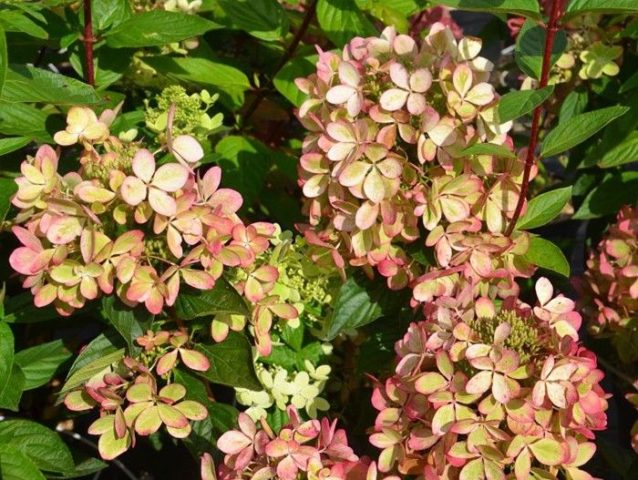
Pastel Green can change colors 7 times a year
Although color changes are typical for most paniculate hydrangeas, Pastel Green changes color especially frequently.
Magical Flame
A compact variety up to 1.2 m in height grows up to 1.3 m. Paniculate hydrangea blooms in July, the inflorescences remain on the shoots until late autumn.
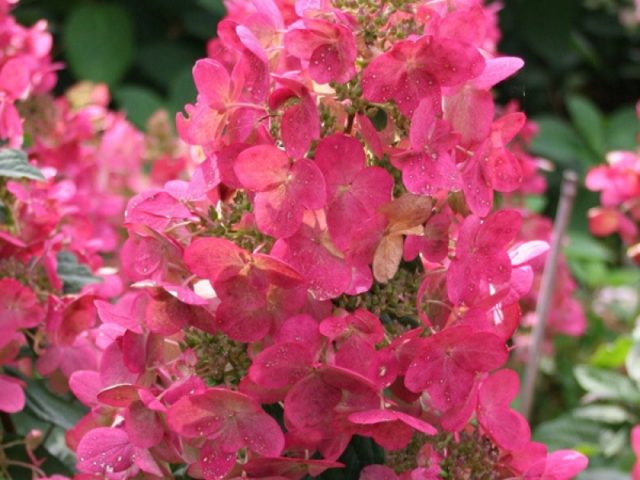
Magical Flame is a very bright purple-pink variety.
An unusual feature of hydrangea is that by the end of summer it takes on a very bright, rich purple-pink hue. This color intensity is rare. In addition, with the onset of autumn, the leaves of the plant turn ruby red, which is why Magical Flame resembles a blazing fire.
Great Star
The Great Star variety grows up to 3 m and begins flowering in mid-summer. The inflorescences of paniculate hydrangea are pure white and do not change color throughout the decorative season.
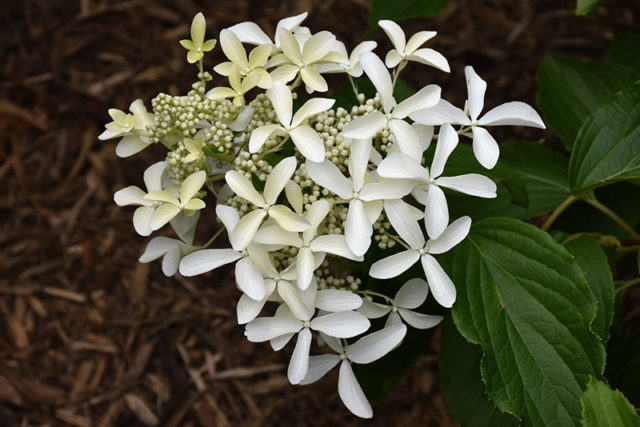
Great Star's petals resemble propellers
This rare variety attracts special attention due to its flowering form - Great Star produces umbrella-type inflorescences, wide and spreading. Individual flowers have four narrow, slightly curved petals, which is why they evoke associations with butterflies or propellers.
Hydrangea paniculata varieties for shade
Most varieties of paniculate hydrangea prefer to grow in lighted areas.But some varieties do well in shade; a small amount of light does not affect their health and decorativeness.
Frize Melba
The height of the variety is about 2 m, flowering begins in mid-July and lasts until the onset of cold weather. Frize Melba produces beautiful lush pyramidal panicles up to 40 cm long. At first the petals of the flowers are white, then they turn pink and acquire a crimson-red color at the bottom. The tops of the inflorescences remain light.
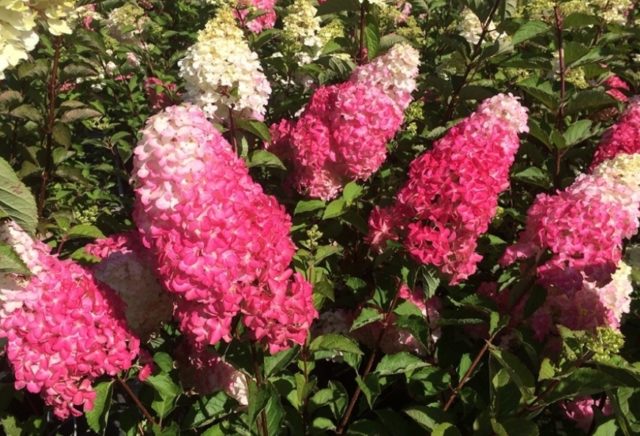
Frize Melba loves the sun, but does well in the shade
Freise Melba requires sunlight, but paniculate hydrangea will thrive in afternoon shade.
Phantom
The medium-sized Phantom hydrangea, reaching 2 m in height, bears flowers in mid-summer and remains decorative until early October. The pyramid-shaped inflorescences of the variety are first white-greenish, and then acquire a light pink color. The peculiarity of the variety is that Phantom does not tolerate the sun well; in the shade, hydrangea develops no worse, but only better.
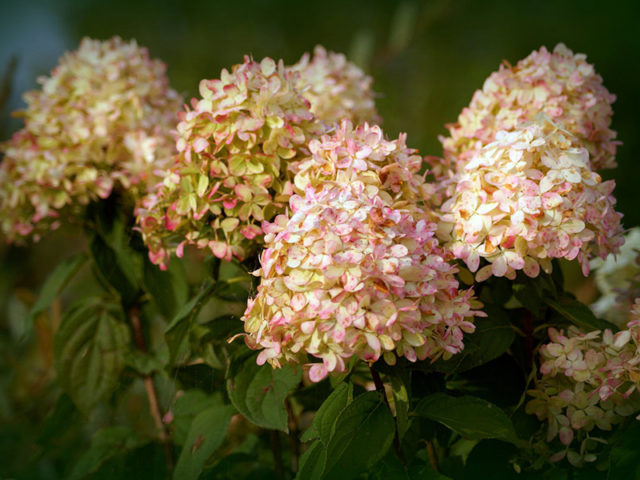
Phantom - shade-loving variety
Kyushu
Paniculata hydrangea Kyushu grows up to 2-3 m, and inflorescences appear on the branches of the bush in mid-summer. Until late autumn, the shrub blooms with large sparse white panicles; by September it begins to turn slightly pink.
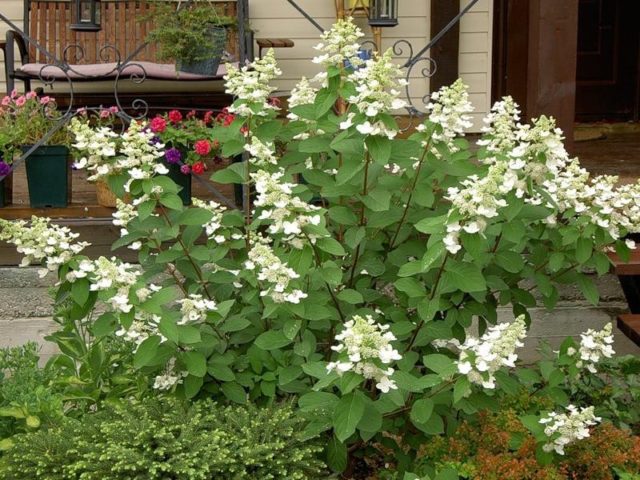
Kyushu grows better in the shade
In sunny areas, Kyushu grows poorly, since the flowering loses its splendor, and besides, the petals fall off in the wind. A shaded place protected from drafts is ideal for planting the variety.
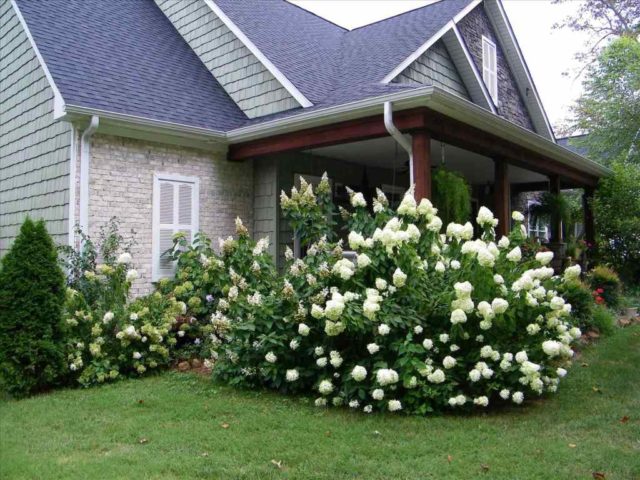
Properly selected hydrangea will transform the garden
Conclusion
Hydrangea paniculata varieties with names open up a whole world of beautiful and low-maintenance shrubs for the gardener. White, pink and red varieties of plants allow you to color the area with bright colors from the beginning of summer until the coldest weather.
Reviews of paniculata hydrangea varieties
